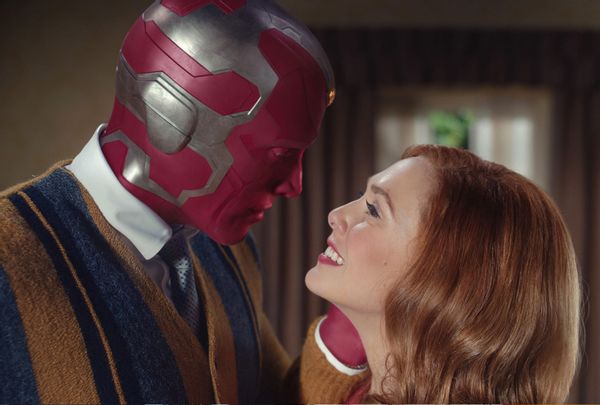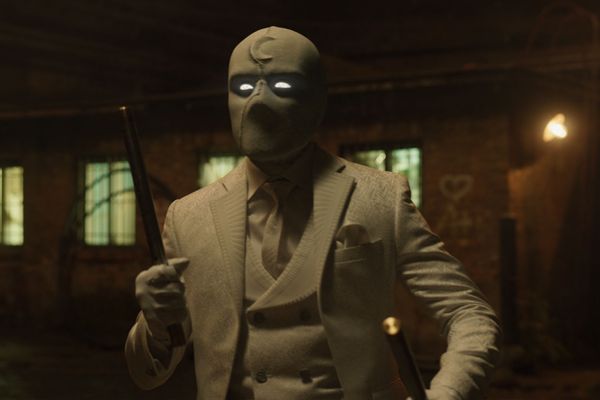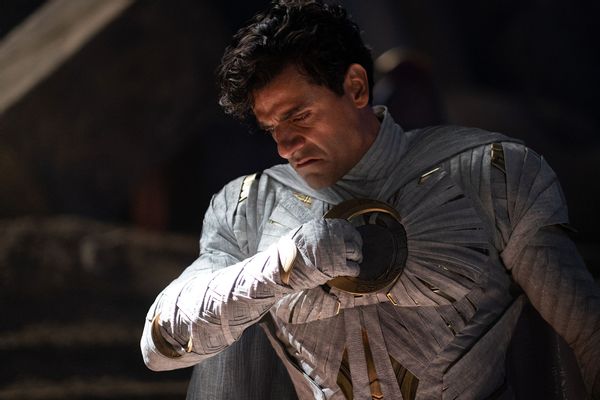
It happened about a week ago, maybe two, during a stroll past a movie theater. Lined up among the tiles of coming attractions was the scarlet and shadows poster for "Doctor Strange in the Multiverse of Madness." But it wasn't until I noticed how close the May 6 release date loomed that my complete lack of urgency related to viewing it struck me in the chest – not with sonic boom's force but, rather, the weightless bounce of an errant dust bunny.
"Is it weird that I'm finding it difficult to care?" I asked my husband, the man who had a massive poster of Stephen Strange covering his bedroom wall when we were in college. If there were ever a guy who was ready for this flavor of Marvel Cinematic Universe action, he's it. Instead, he responded with and shrug and an "Eh!" before continuing to mosey along.
"Is it weird that I'm finding it difficult to care?"
Love chills over time. This is as true of a longstanding cinematic franchise's relationship with its fans as it is of the bond between people, although with movies it's less of a give-and-take than a one-way effort, with the onus weighing on studios to keep the audience's fidelity alive. My husband and I share a lifelong affection for comic books. We've also powered through so many hours of substandard TV episodes and movies that we're much slower to leap at them now than we ever were.
RELATED: Benedict Cumberbatch's best misfits
Judging from the record-breaking pre-sales numbers for "Doctor Strange," the MCU isn't in any danger of being jilted. Benedict Cumberbatch's return as a headliner is projected to earn $160-180 million this weekend in North America alone, with global returns expected to push that payday higher.
But box-office reports don't tell us everything about our deeper feelings toward a franchise that is increasingly associated with terms such as "sprawl" and "bloat." Lukewarm though my feelings are, I'm still going to see it this weekend with friends . . . mainly to spend time with said wonderful people.
Recall that at the beginning of 2021, Disney+ gave us "WandaVision" and lo, it was good.
The continued dominance of the Marvel universe in theaters and streaming stands as a reminder that we still haven't reached peak superhero saturation. But a brand's popularity doesn't plummet overnight. It happens inch by inch, individual by individual, until enough of us awaken to the realization that diversions we once anticipated with a child's buzzy glee are slightly altered versions of the same increasingly mediocre commodity.

Surely it has nothing to do with Marvel's content output accelerating. Right?
Since "Iron Man" came out in 2008, there have only been two years in which we haven't had a Marvel release: 2009 and 2020. At least two Marvel movies have come out per year since 2013; in 2017 the release rate went up to three, which we could still handle.
Then both the pandemic and Disney+ entered the picture, and suddenly our mind palaces were flooded.
I probably would be absolutely jazzed about "Doctor Strange" if Disney hadn't diluted my passion for all thing Marvel-related by busting out "Black Widow," "Shang-Chi and the Legend of the Ten Rings," "Eternals," "WandaVision," "The Falcon and the Winter Soldier, " "Loki," "What If…?" and "Hawkeye" in the same year.
Out of that onslaught, only four titles are indisputably worth the time and attention. Two of them – "WandaVision" and "Loki" – have direct storyline bridges to "Doctor Strange," along with "Spider-Man: No Way Home" (Technically Sony's Columbia Pictures holds the rights to all Spider-Man movie-related properties.)
While it isn't the worst of the MCU series, "Moon Knight" represents a steep plunge in originality from earlier Disney+ releases.
The action in "WandaVision" is central to the version of Wanda Maximoff (Elizabeth Olsen) that we encounter in the new "Doctor Strange," which was written by "Loki" head writer Michael Waldron. But only "Spider-Man" is proximate to this new release . . . and my experience with "Moon Knight," regrettably, is fresher, given the season finale's recent airing.

The same goes for directors; the chance to see Sam Raimi realize the Marvel multiverse is another reason to see "Doctor Strange," someone reminded me. In turn, I reminded that person that I was also excited to watch Chloe Zhao's take on "Eternals," which turned out to be an unnecessarily long, spirit-deflating runway toward announcing Harry Styles' impending entry into this overstocked super-person safari.
As for Isaac, he is as beguiling of a presence in "Moon Knight" as he is in whatever project he takes on, and acts the heck out of his dual role as Marc Spector and Steven Grant, two aspects of the character's dissociative identity disorder. Isaac's distinctive rendering of each man is both sensitive and sensational. And his co-star May Calamawy matches his energy when she plays against him as Marc's wife Layla.

Its culmination in an entirely ordinary CGI battle and resolution accentuates the MCU structure's wash, rinse, repeat feel. I would never suggest that a superhero story entirely forgo all the punch-and-boom; that's a major part of the genre's allure. But more than a year has passed since "WandaVision" aired its last episode, and while a repeat viewing may remind me of why I was once excited about this world – or these worlds, I should say – it may have the opposite effect.
Want a daily wrap-up of all the news and commentary Salon has to offer? Subscribe to our morning newsletter, Crash Course.
Right now I could very well be alone in this, but history and memory hint otherwise. Remember when we all agreed to take a break from "Star Trek"? How about the moment "Star Wars" fans cried out "Enough!" in unison? (My cold turkey moment came after viewing the space hippos romping in the fields of Naboo in "Attack of the Clones". . . I mean, honestly.) Those days are long gone too; between Paramount + and the Lucasfilm channel on Disney+, we're awash in more "Star Trek" and "Star Wars" titles than ever.
But wait, there's more – coming soon are expansions of J.R.R. Tolkien's Middle Earth chronicles and "House of the Dragon," one of several planned prequels to "Game of Thrones."
In a time when fandom has more commercial value than originality, Disney, Marvel, and the rest are simply providing for a marketplace they see responding to a fantasy glut by opening its mouth wider and bracing for impact. And we will continue to buy into it as long as movie theaters retain their post-pandemic novelty.
The spectacle is the central currency of movies like "Doctor Strange," guaranteeing that even people like me who have lost some delight in this business will at least remember how much better all that magic looks when presented on a canvas many times our size. I'm sure I'll have a great time with "Doctor Strange in the Multiverse of Madness," if only to enjoy the company. As for whether it or any future Marvel TV and movie titles will qualify as unforgettable, I have my doubts.
"Doctor Strange in the Multiverse of Madness" is now playing in theaters.
More stories like this:







